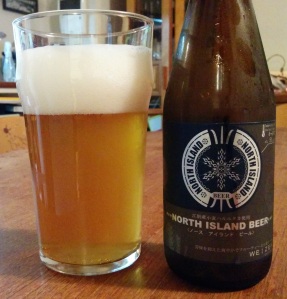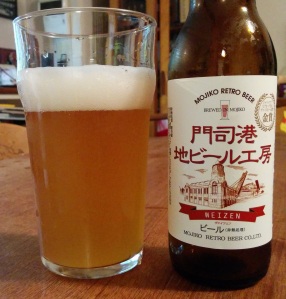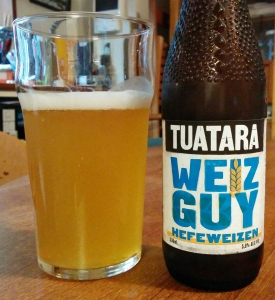With the abundance of weizens in Japan we’re still working our way through some of the standard weizens here. Today we have the North Island Weizen, the somewhat-less-common-but-still-regular-offering Mojiko Retro Weizen, and from New Zealand the Tuatara Weiz Guy.
North Island Weizen (ノースアイランド・ヴァイツェン)

Vitals:
ABV: 5.0%
Availability: Year-round
Package: 330mL bottle
Review:
Pour – Very foamy and creamy, gold but slightly dark for a weizen, relatively clean
Aroma – Spicy banana, lemon, wheat
Flavor – Initially somewhat tart, fair amount of lemon and wheat in the middle, finish is banana cream, loses bite as it warms up
While we like North Island quite a bit, they really get most of their kudos for their bolder beers, such as their IPA or their Coriander Black. Their weizen doesn’t get a whole lot of attention, and the only brewing notes I can really find mention their use of “haruyutaka” wheat for this beer. That’s also the same wheat they use in their Coriander White, and it’s a locally grown wheat in Hokkaido that’s used for bread and noodles around the area.
The North Island Weizen is a solid weizen that’s quite flavorful at first. It becomes watery as it warms up, but if you catch it early there’s a good amount of flavor in there. Overall it is quite heavy on the wheat and banana, but also has some lemon tartness in there that is a nice touch. It’s not spectacular, but one of the better regular lineup weizens available in Japan.
Of course, it does suffer from the high price associated with North Island beers. I purchased mine for 590 yen at Liquors Hasegawa, and while the higher price for some of their beers may be justifiable for the more interesting ones, I can’t recommend this decent but not world-beating weizen at that price. Try it if you like, as the quality is OK, but I personally can’t recommend it at the standard North Island prices.
Mojiko Retro Weizen (門司港地ビール・ヴァイツェン)

Vitals:
ABV: 5.5%
Availability: Year-round
Package: 330mL bottle
Misc: IBU – 10
Review:
Pour – Unfiltered cloudy, creamy foam that settles quickly, pale gold
Aroma – Nicely balanced aroma of cloves, banana, and wheat, more banana aroma as it warms up
Flavor – Creamy texture, light but not watery, pepper, cloves, and wheat are strong, slight banana on the finish
This is our first entry on Mojiko Retro, so let’s take a quick look at the brewery. As you might guess from the name, the Mojiko Retro brewery is situated in Moji Port in Fukuoka. Mojiko Retro itself is the name of a redevelopment project based around the port and Mojiko Station to create both a historical site and a revitalized commercial/tourist district. One of those old sites is the Moji Mitsui Club, whose claim to fame is that Albert Einstein stayed there when he visited Japan in 1922 with his wife shortly after receiving the Nobel Prize in Physics in 1921.
The brewery itself, which actually in Japanese is called something like Mojiko Local Brewery (門司港地ビール) rather than Mojiko Retro (which as I mentioned above refers to the port development site) was started in 1998. The inspiration for the brewery was, according to company lore, a trip to Tacoma, WA, where the founder was impressed with the quality of the craft beer there. He figured that if that small port city on the other side of the world could make great beer, then certainly they could approximate that port craft beer experience well enough over here.
As far as their beer goes, like many other breweries that got their start in the first craft beer boom in the mid-to-late-’90s, they make a hodgepodge of styles. Their regular lineup consists of a weizen, English pale ale, and a Vienna lager. They’re pretty minor as far as Japanese breweries go, and you almost never see their beers around either on tap or in bottles. However, we did manage to get our hands on this weizen so let’s give it a go.
The Mojiko Retro Weizen is an interesting take on the weizen, with a lot more pepper and spice as opposed to banana. The most interesting thing about it, though, was that while it was extremely light in touch and feel it wasn’t bland or watery at all. I liked the creamy texture, and I liked how it did still manage to touch all of the required weizen bases even though it was pretty mild overall. It isn’t the boldest weizen out there, but highly drinkable and well-made.
As I mentioned before it’s hard to find their beers, but I found this one at Tanakaya for 525 yen. They normally stock it together with the Mojiko Retro Weizen Strong, which is there decently-rated weizen bock. I’ve also seen their beers at Le Petit L’ouest in Shimokitazawa, so those would be your best bets for tracking down this beer.
Tuatara Weiz Guy

Vitals:
ABV: 5.0%
Availability: Year-round
Package: 330mL bottle
Misc: IBU – 15; hops – Pacific Jade
Review:
Pour – Super cloudy with lots of sediment, very pale yellow, not super-foamy
Aroma – Good banana, malts, wheat as well
Flavor – Very spicy initially, wheaty and malty in the middle, banana is quite restrained given the aroma, finish has some cloves but also more malts, fairly malty overall, loses a lot as it warms up
This is also our first look at Tuatara, which is a brewery located in Wellington, New Zealand. It’s another example of a successful craft brewery sold out, having been purchased by DB Breweries (a New Zealand macro-brewery owned by Heineken) in 2017. They were founded in 2000 with a view to providing a contrast to macro-beer, so it’s just another example of mindless hipster craft beer marketing speak before taking the money.
On a more fun note, the brewery is named after the tuatara, which is an ancient reptile native to New England that dates back to the Jurassic era. Although it looks like a lizard, it belongs to a different order (Rhynchocephalia in case you’re interested), and as the only remaining species of that order is very popular for research studies. The name tuatara comes from the Maori language and means “peaks on the back”, which is an apt enough description for it. Perhaps the most interesting feature of the tuatara is that it has a third eye on top of the head, which doesn’t quite “see” in the normal sense but is sensitive to light and may be used to help detect temporal or seasonal changes. Here’s a great video of a baby tuatara being hatched and looking for food.
As for the beer itself, the one brewing note that catches my eye is the use of the Pacific Jade hop. I’m not familiar with this hop, but it’s a descendant of the Saaz hop (famous for Czech pilsner usage) and is supposed to be rather spicy with also some citrus.
The Tuatara Weiz Guy is indeed very spicy, especially at first. The spice effect wears off relatively quickly though, leaving you with on the whole a malty weizen. It does not have as much of a banana effect as you see in many weizens, which was a bit surprising here given that the aroma was pretty strong on the banana, but it was clear on the tasting that this weizen was mostly about the malts and wheat. I personally didn’t think it was put together all that well, with a somewhat bland aspect to the weizen that expanded into a real wateriness. In short, this wasn’t terrible but didn’t quite come though on the flavors to make this a standout weizen.
I’ve actually had decent Tuatara beers before, so this one was definitely a disappointment. On the plus side, it’s pretty cheap (only about 400 yen at Tanakaya), but then again, on the down side, that’s most likely a result of them having sold out, which allows them to have more widespread and cheaper distribution. In fact, I’ve been seeing their beers around a lot more recently at reasonable prices, which isn’t all bad news, but given the mediocre nature of this beer and the brewery ownership I can’t really recommend it.
So if we have to pick a winner today, I’d probably call it a draw between the North Island Weizen and the Mojiko Retro Weizen, with the Tuatara Weiz Guy bringing up the rear. The North Island has stronger flavors at first but thins out some, and also has a higher price. The Mojiko Retro is milder to begin with, but well-balanced and offers enough flavor even without that punch. It’s also a bit cheaper, although still not that cheap necessarily. I’d say they’re both worth a try at least once, although for regular drinking you may stick to the nice standard and limited weizens (another plug for the Mandarina Bavaria) that Fujizakura Heights conjure up very nicely.